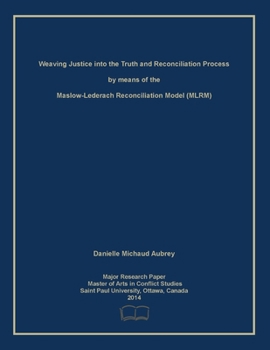Weaving Justice into the Truth and Reconciliation Process by means of the Maslow-Lederach Reconciliation Model (MLRM)
A model is presented in which the five hierarchal needs of Abraham Maslow align with the four reconciliation elements of John Paul Lederach:
the Maslow-Lederach Reconciliation Model (MLRM).
The matrix is used to identify and assess restorative justice programs and policy concerning injured ethnic groups on a national level. The Truth and Reconciliation Commission process in both South Africa and Canada are assessed based on their shared historical experience in which the indigenous populations suffered under European colonial rule. Three threads emerge:
(1) unjust removal, marginalization and exclusion from mainstream society,
(2) experience of servitude, assimilation and segregation affecting their political and socio-economic status, and
(3) lack of freedom to own land and prosper from its use and development.
This model can be readily applied to contemporary situations.





